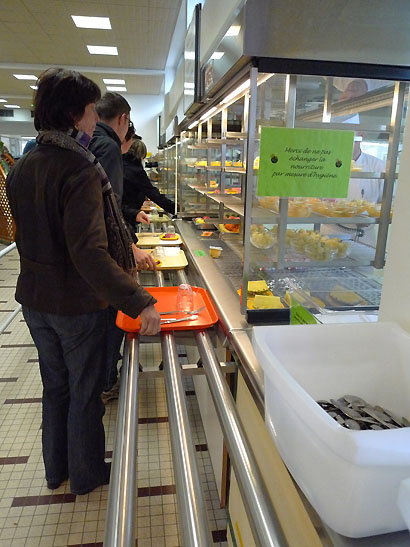The politics of “bonjour”
When North American social skills don’t measure up in France
Share

Lycée has given a new meaning to teenage awkwardness. While I’ve never felt especially socially anxious in high school, teaching at a high school has given me a chance to relive this experience. It’s like that Diet Pepsi commercial when the middle-aged accountant says he wants to feel young again. It takes sporting his old Flock of Seagulls hairstyle again to realize it was a bad idea. In my high school do-over, I have a lot of new worries that I never had the first time around.
Lunch time is the most anticipated, yet worrisome, part of my day. The lunch culture in France is completely different. Lunch begins strictly at noon and lasts until 1:30 p.m. at school (sometimes until 2 p.m. elsewhere. ) Most institutions are closed during this time (except restaurants) while the French observe their dining ritual. Consequently, the school cafeteria here is excellent and almost everyone eats there. This is not the Aramark-run cafeteria that was the blight of my high school and university. At Lycée Koeberlé, for 2,40€ you get a dessert, a dairy product, an entrée, a main course and as much organic bread as you can eat. The main courses, entrées and usually at least one of the desserts are always prepared à la maison. There’s a choice between two main courses and usually at least four items in the other categories to choose from. Already I’ve dined on Alsatian specialties like choucroutte and the French version of black pudding.
Yet there is always a hint of social awkwardness during this otherwise exciting part of my day. There is always a monsterous line of people waiting to be let into the cafeteria and all teachers, including myself, have the privilege of skipping it. Every time I cut to the front, I feel a twinge of worry that the monitor will stop me and tell me cutting in front is for profs only. I would then have to explain, in broken French, that I am the English assistant. This has not happened yet, but other members of the staff have mistaken me for a student before. Once I get into the cafeteria, I fill my tray and head to the salle de profs to find dining companions.
Cliques don’t end after the high school. In fact, most of the teachers sit together by department. As I wait in line for food, I hope there will be some free space around the English department or the few other teachers I know outside the department. If there is, I can openly listen in, try (unsuccessfully) to follow their wildly-fast French conversations and occasionally get thrown a bone in English. If there isn’t a seat near anyone I know, this means it’s time to lift my chin up, say a bright “bonjour” and plop myself down next to a group of random teachers.
Speaking of which, I’m still trying to get a handle on basic greetings. The French say “hello” to each other constantly, all day long. Being here makes me realize how acceptable it is to slip in and out unnoticed in Canada. In stores you’re expected to say hello and goodbye to the clerks and expect the same from them. At parties, whenever someone new arrives, they work the room by giving bisous (cheek kisses) and introducing themselves to everyone. Imporant note: girls are expected do the bisous with everyone (male or female). Guys normally shake hands with one another and only do the bisous with one another if they are really good friends.
At work, it’s another story. In the staff room, it feels like everyone is always announcing their presence with a “bonjour” or “salut.” I try my best to keep up but it’s hard to know what is appropriate. When I walk into a silent room of working teachers sometimes I feel like I’m interrupting everyone. If I’m the one of the working teachers, I feel bad if I was too distracted by work to break myself away to say hello. While it may sound strange, I was not prepared for the sheer amount of “hello” involved in living in France. Then course, there’s the task of choosing the appropriate greeting. There are the more formal ones (“bonjour,” “bon après-midi,” “bonsoir” and “bonne soirée”) that are time sensitive. While more casual or familiar ones (“salut” or “coucou”) are valid all day, I’m not sure who it’s appropriate to use them with–especially at work.
I can push most of the blame for this confusion onto the language barrier, but that doesn’t make it easier to get through the day. For the most part, I hope that I am not seen as the antisocial foreigner. I always need to fight my impulse to extend my hand for a handshake in social situations. I still have trouble figuring out who it’s appropriate to address with “tu” or “vous.” I’m always asking myself if I’m coming off too familiar or too cold. The French are always stereotyped as rude, but living here, I hope it’s not me that’s the rude one.